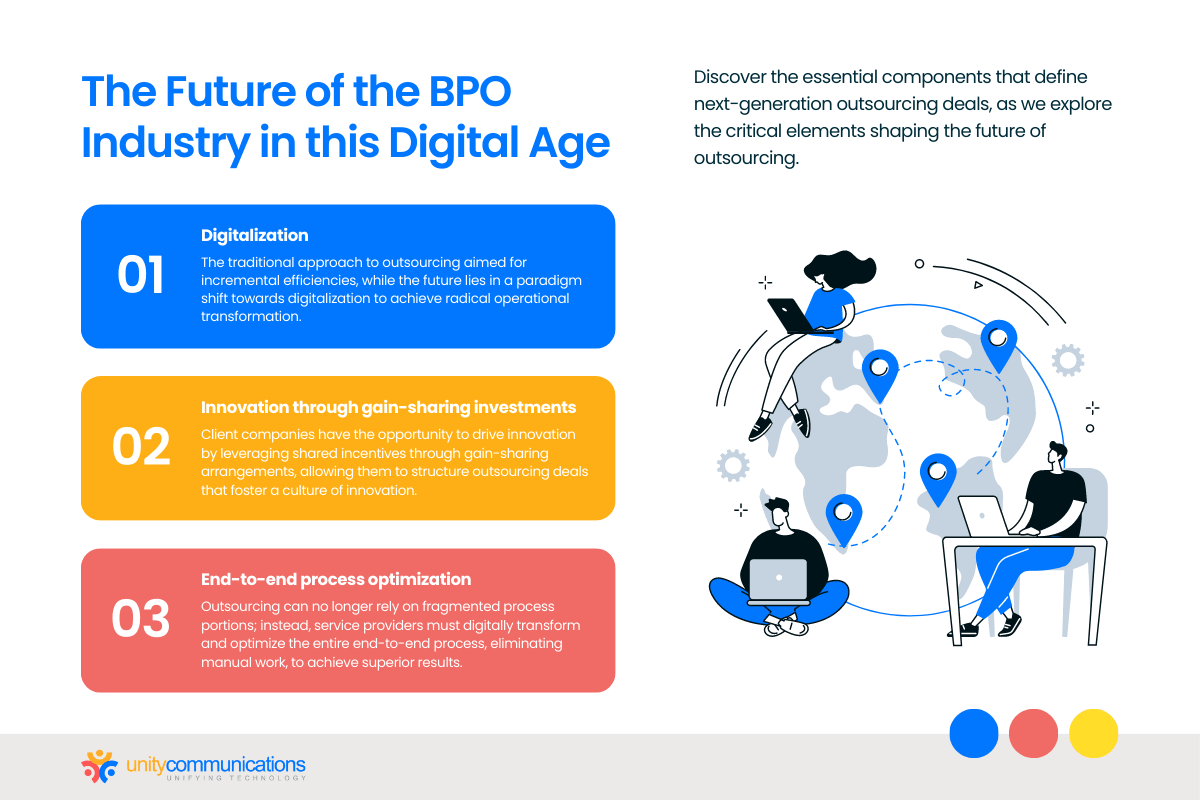Table of Contents
Gone are the days when outsourcing vendors provided only limited services and catered to selected clients. With globalization accelerating, business process outsourcing (BPO) has become more accessible to companies across different industries and sizes.
As the world embraces digital transformation, seeing where the outsourcing industry will go is fascinating. Here is a glimpse of the future of the BPO industry in this digital age and the trends that will shape the sector further.
BPO Trends to Lookout For

Before we begin, what is BPO? It is the process of delegating business processes to a third party.
The best infrastructure and systems, the latest technology, and top-tier workers will power the BPO sector of the future. BPO companies must be efficient enough to withstand future crises.
Disruptions and advancements cannot easily eradicate outsourcing services. Instead, they help improve its potential to deliver value-adding solutions. Here are different trends that can shape the future of the BPO industry in this digital age:
- Automation: We can expect the BPO industry to become more automated in the future through artificial intelligence (AI) and robotic process automation (RPA). Automation will support agents instead of replacing them. With automation, workers can free up time from repetitive workloads and focus more on complex tasks.
- RPA and AI: The global BPO industry expects growth of up to $577 billion by 2030 at an 8.9% compound annual growth rate (CAGR). Using RPA and AI will accelerate the industry’s growth during the forecast period. Another driver is the rise in information technology (IT) investment in companies due to digital transformation.
- Conversational AI: Although BPO has been using conversational AI for a while, its use cases will expand. Voice bots or voice AI are good examples because they reduce customer complaints. Additionally, customers learn from prior interactions with AI regarding complex issues, further reducing complaints and improving customer service.
- Contact center as a service (CCaaS): Another factor that could shape the future of the BPO industry in this digital age is CCaaS, which combines cloud-based infrastructure and contact center hosting for a flexible, pay-as-you-go service model. As more businesses embrace cloud-based services, this technology will likely gain traction.
- Self-service options: With bots and automation, self-support options in call center services will improve. New forecasts disprove the old belief that self-service would eventually replace human interaction. Self-service will handle most inquiry resolutions, letting agents focus on complex issues that need intervention.
- Training and upskilling: With more and more bots and AI programs taking over repetitive and simple work, agents must be ready to handle complex tasks. Enhanced training and upskilling are necessary to prepare them for value-adding functions and inform them of the latest technological changes.
- Remote work: Many BPO services have adapted to remote work to maximize resources. This allows for more flexible and productive setups, empowering agents to provide the best support to end users and improve customer satisfaction. Remote work prevents location dependency, enabling agents to serve clients regardless of their time zone.
- Security standards: The rise of remote work highlights the need for better security standards. A distributed workforce requires BPO companies to add another layer of data security to retain their clients. This means incorporating multi-factor authentication and training employees on data protection.
- Value roles: As BPO companies keep up with the digital age, they will open up new roles. BPO providers project a spike in demand for programmers, data scientists, and analysts to process large amounts of data.
Challenges That the BPO Industry Is Facing in the Digital Age

In the current landscape, outsourcing providers encounter distinctive challenges that demand their attention and resolution. This compilation sheds light on the prevalent issues that BPO companies grapple with, potentially influencing the trajectory of the BPO industry in this digital age.
- Surge in Self-Service: According to research by Gartner, 70% of consumers prefer seeking answers to their inquiries on a brand’s website rather than contacting a customer service agent. BPO firms must facilitate convenient access to self-service options to enhance their clients’ customer support.
- Escalating Mobile Usage: Customers now access brands through various channels on a single device, expecting seamless connectivity. While this presents certain challenges, it also offers opportunities for swift customer engagement. Companies can centralize their brand knowledge to enable users to access it through various touchpoints.
- Heightened Emphasis on Digital Security: BPO companies handle confidential client data, making digital security critical. These firms are acutely aware of the risks posed by potential data breaches, necessitating secure networks, regulatory compliance, and client buy-in.
- Shifting Regulatory and Political Landscape: Changes in political scenarios can have repercussions for the BPO sector. Economic instability or protests can impact offshore workers, while new legislation may restrict outsourcing in specific regions. As a result, BPO companies must stay informed about the political dynamics of relevant countries to ensure compliance.
- Disrupted Communication: Most interactions between BPO companies and their clients occur through digital platforms, making them susceptible to disruptions caused by internet outages or poor connections. However, modern communication tools have mitigated these disruptions, and BPO providers have implemented contingency plans to address such challenges.
Despite these obstacles, the outlook for the BPO industry in the digital age remains promising. Innovative technologies like robotic process automation (RPA) and AI tools empower BPO firms to expand their service offerings and compete in higher-value segments. These advancements enable them to propose mutually beneficial pricing structures, generate cost savings for clients, boost margins, and deliver exceptional service.
The Future of the BPO Industry in this Digital Age
Now that you know the trends and current state of outsourcing, let us discuss the future of the BPO industry in this digital age.
How should your business leverage these advanced solutions in the future? With business process management (BPM), of course.
BPM is a discipline that measures, analyzes, optimizes, and improves business processes for a more effective and efficient organization. BPM providers manage full business processes for you, from generating ideas to making plans, augmenting staff, and managing operations.
According to McKinsey, the BPO industry must evolve from traditional outsourcing and basic automation to entirely digitized operations through BPM. Learn the most utilized BPO models and identify how to evolve from traditional outsourcing. Here are critical elements of next-gen outsourcing deals:
- The legacy approach was a straightforward transaction geared towards generating marginal efficiencies. The future should focus on radically transforming operations through digitalization.
- Client companies can leverage shared incentives aligned with innovation. Through gain-sharing arrangements, they can structure deals to incentivize innovation.
- Outsourcing a single, fragmented portion of a process and hoping to see better results will no longer be applicable. Service providers must own and transform the process from end to end by digitizing, optimizing, and eliminating manual work and processes.
The Bottom Line

Companies will always need to maximize resources to keep operations afloat and focus on growth, so it is safe to say that the future of the BPO industry in this digital age is bright. Outsourcing is a great solution to tap into the best teams and leverage automation technologies. It also allows businesses to expand without using much of their resources.
With our years of experience, Unity Communication has become a global leader in digital transformation, combining expertise, technology, and solutions that help you achieve your goals. Let’s connect to discuss how we can help.



